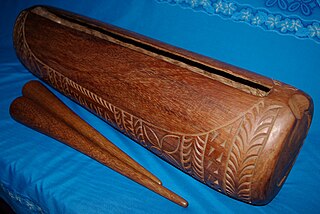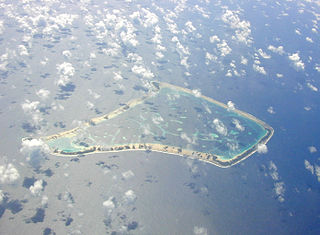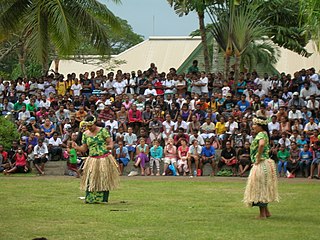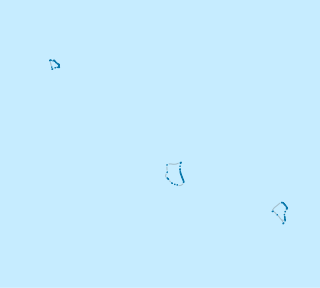 |
|---|
|
General elections were held in Tokelau on 23 January 2020. [1] [2]
 |
|---|
|
General elections were held in Tokelau on 23 January 2020. [1] [2]
The General Fono consists of a Faipule (representative) and a Pulenuku (village mayor) elected in each of the three villages (Atafu, Fakaofo and Nukunonu). Each village also elects one delegate for every 100 residents. [3] All elections in Atafu and Fakaofo took place under a two-round system, where if no candidate obtains over 50% of the vote, the top two move on to a runoff election to decide the winner. If there were multiple delegates elected in a village, majority-at-large voting was used. Nukunonu elections took place under traditional rules, where election arrangements were managed and conducted autonomously according to each village Taupulega.
| Position | Atafu members | Fakaofo members | Nukunonu members |
|---|---|---|---|
| Faipule | Kelihiano Kalolo | Fofo Tuisano | Siopili Perez |
| Pulenuku | Faamanuia Tamoa | Mose Pelasio | Lino Isaia |
| Taupulega Representatives (Village Elders) | Sirila Enosa | Kaio Isaako | Peato Pelenato |
| Stanley Lopa | Tinielu Tuʻumuli | Alapati Tavite | |
| Teloloma Paulo | Pafelio Tumua | ||
| Fatupaepae Representatives (Council of Women) | Latu Lopa | Hina Kele | Lepeka Amato |
| Malia Pue | |||
| Taulelea/Aumaga Representatives (Men's Group) | Nofo Iupati | Tofiga Teao | Havelio Tumua |
| Aokuso Vavega | |||
| Source: Radio New Zealand | |||

Tokelau is a dependent territory of New Zealand in the southern Pacific Ocean. It consists of three tropical coral atolls: Atafu, Nukunonu, and Fakaofo. They have a combined land area of 10 km2 (4 sq mi). The capital rotates yearly among the three atolls. In addition to these three, Swains Island, which forms part of the same archipelago, is the subject of an ongoing territorial dispute; it is currently administered by the United States as part of American Samoa. Tokelau lies north of the Samoan Islands, east of Tuvalu, south of the Phoenix Islands, southwest of the more distant Line Islands, and northwest of the Cook Islands.

The music of Tokelau occurs in the atolls of Atafu, Nukunonu, and Fakaofo. It is dominated by communal choral activity in harmony, with percussive accompaniment including log drums (pate), pokihi and apa. Nukunonu is notable for traditional song and dance.
Tokelau may refer to:

Fakaofo, formerly known as Bowditch Island, is a South Pacific Ocean atoll located in the Tokelau Group. The actual land area is only about 3 km2, consisting of islets on a coral reef surrounding a central lagoon of some 45 km2. According to the 2006 census 483 people officially live on Fakaofo. Of those present 70% belong to the Congregational Church and 22% to the Catholic Church.

The politics of Tokelau takes place within a framework of a parliamentary representative democratic dependency. The head of state of Tokelau is King Charles III in right of his Realm of New Zealand, who is represented by an Administrator. The monarch is hereditary, the Administrator is appointed by the New Zealand Minister of Foreign Affairs and Trade.

Kuresa Nasau is a Tokelauan politician who has served as head of government five times and as faipule of Atafu.

Cyclone Percy was the seventh named storm of the 2004–05 South Pacific cyclone season and the fourth and final severe tropical cyclone to form during the 2004–05 South Pacific cyclone season. Cyclone Percy originated as a tropical disturbance on February 23. Over the course of the next few days, the system organized while moving east-southeastward, before intensifying into a Category 1 tropical cyclone on the Australian region scale on February 26. The system quickly intensified, reaching Category 4 status later that day. On the next day, Percy was steered southward by a blocking ridge of high pressure, while stretched out the structure of the storm into an elliptical shape, weakening it back to Category 3 status. Afterward, the storm rapidly reintensified, reaching its peak intensity as a Category 5 tropical cyclone on March 2. Afterward, Percy encountered increasing wind shear and weakened once again, turning southeastward on the next day. On March 5, Percy transitioned into an extratropical storm, before dissipating soon afterward.

The Roman Catholic Mission Sui Iuris of Tokelau in Tokelau is a suffragan mission of the Roman Catholic Archdiocese of Samoa-Apia. It was formed in 1992 when the Archdiocese of Samoa-Apia and Tokelau was split into the Archdiocese of Samoa-Apia and the Mission Sui Iuris of Tokelau. The current Ecclesiastical Superior is Archbishop Alapati Lui Mata’

A referendum on self-determination was held in Tokelau on 20 October and on 22–24 October 2007, with the result being that self-governance was rejected. Had it been successful, the referendum would have changed Tokelau's status from an unincorporated New Zealand territory to a self-governing state in free association with New Zealand, akin to the Cook Islands and Niue. However, the referendum required a two-thirds positive vote to pass, and the "yes" side fell short of the required total by 16 votes.

Parliamentary elections were held in Tokelau on 17 January, 18 January and 19 January 2008 to elect the 20 members of the General Fono. The elections saw Kolouei O'Brien replaced as faipule of Fakaofo by Foua Toloa.

The following outline is provided as an overview of and topical guide to Tokelau:

The Council for the Ongoing Government of Tokelau is the executive body in Tokelau. It serves as the governing organization for Tokelau when the General Fono is not in session. The council has six members, consisting of the faipule (leader) and pulenuku of each of the three atolls, Fakaofo, Nukunonu, and Atafu. It was established in November 2003, replacing the Council of Faipule, which had been established in 1993 and had three members – the three faipule.

Tokelau has two official languages: Tokelauan and English. Over 90% of the population speaks Tokelauan, and just under 60% speak English. Also, 45.8% of the population speak Samoan, and small percentages of the population speak Tuvaluan and Kiribati.
There are three schools in the whole of Tokelau. Each school is located on each of the three atolls. Tialeniu School is on the atoll of Fakaofo, the most southern of the three islands. Matiti School is on Nukunonu, while Matauala School is on the island of Atafu.

The vast majority of people in Tokelau are Christians and Christianity plays a significant role in the Tokelauan way of life.
Smoking in Tokelau is prevalent, with ethnic Tokelauans having the highest smoking prevalence of all Pacific ethnicities. In the 2011 Tokelau Census, 47.8% of people aged over 15 were found to be regular cigarette smokers.

General elections were held in Tokelau between 23 and 31 January 2017.

Tokelauan people are a Polynesian ethnic group native to Tokelau, a Polynesian archipelago in the Pacific Ocean, who share the Tokelauan Polynesian culture, history and language.

The COVID-19 pandemic in Tokelau is part of the ongoing worldwide pandemic of coronavirus disease 2019 caused by severe acute respiratory syndrome coronavirus 2. Tokelau reported its first confirmed case on 21 December 2022.

General elections were held in Tokelau on 26 January 2023.